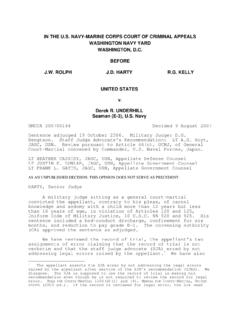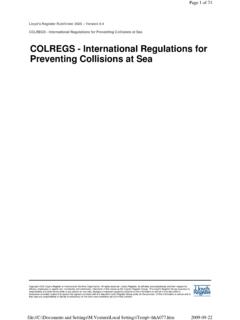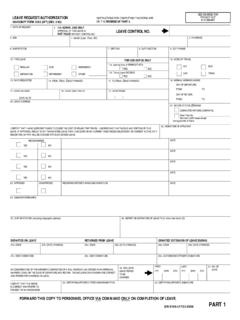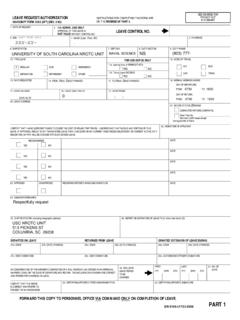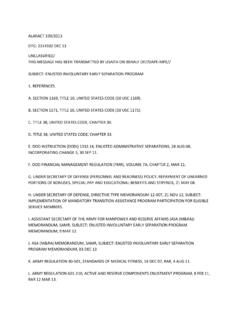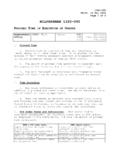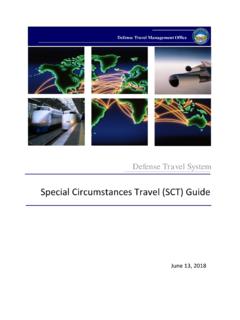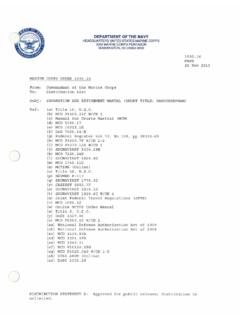Transcription of IN THE U.S. NAVY-MARINE CORPS COURT OF …
1 IN THE NAVY-MARINE CORPS COURT OF CRIMINAL APPEALS. WASHINGTON NAVY YARD. WASHINGTON, BEFORE. ROLPH THOMPSON VINCENT. UNITED STATES. v. Kimberly D. GLADDEN. Corporal (E-4), Marine CORPS NMCCA 200600905 Decided 17 July 2007. Sentence adjudged 03 February 2006. Military Judge: Winklosky. Staff Judge Advocate's Recommendation: Capt Campbell, USMC. Review pursuant to Article 66(c), UCMJ, of Special COURT -Martial convened by Commanding Officer, Headquarters and Service Battalion, Marine CORPS Recruit Depot, Eastern Recruiting Region, Parris Island, SC. LT LOKEY, JAGC, USN, Appellate Defense Counsel Capt SRIDHAR KAZA, USMC, Appellate Defense Counsel Capt JAMES WEIRICK, USMC, Appellate Government Counsel AS AN UNPUBLISHED DECISION, THIS OPINION DOES NOT SERVE AS PRECEDENT. THOMPSON, Judge. A special COURT -martial, composed of enlisted and officer members, convicted the appellant, contrary to her pleas, of one specification of wrongful use of cocaine, in violation of Article 112a, Uniform Code of Military Justice, 10 912a.
2 The appellant was sentenced to 21 days confinement, reduction to pay grade E-1, and a bad-conduct discharge. The convening authority approved the sentence as adjudged. After carefully considering the record, the appellant's sole assignment of error alleging that the military judge erroneously admitted urinalysis test results where no probable cause existed to conduct the test, the Government's answer, and the appellant's reply, we conclude that the findings and sentence are correct in law and fact and that no error materially prejudicial to the substantial rights of the appellant was committed. Arts. 59(a). and 66(c), UCMJ. Admission of Urinalysis Test Results The appellant contends that the military judge erroneously admitted into evidence the results of a urinalysis test, claiming that there was insufficient probable cause to order the appellant to provide a urine sample. We disagree.
3 On 30 August 2005, the appellant had submitted a leave request in order to care for her sick child. Pending approval of her request, she reported to her work station. The appellant was notified by at least three individuals that she was required to submit a urine sample in the course of a random urinalysis prior to going on leave at 1201 on 30 August 2005. She acknowledged to all three notifying individuals that she would provide the sample before going on leave , at one point stating that she would provide the sample when she picked up her leave papers from the administrative office, which was adjacent to the testing site. The appellant did not provide a urine sample as she was required to do prior to going on leave . At approximately 1600, the Battalion Commander was notified that several Marines had not provided samples. It was ascertained that the appellant was the only Marine who had received notification to participate in the random urinalysis and was not otherwise excused or accounted for.
4 The battalion commander requested that the appellant be called back in to provide the sample. At approximately 1700, the appellant did return to the command. However, since the personnel conducting the test had been present over 12 hours, the battalion commander made the determination to terminate the random urinalysis testing at approximately 1800, and he did not order the appellant to provide a sample pursuant to the unit inspection. Instead, the appellant was offered the opportunity to consent to a urinalysis. After she refused to consent, the battalion commander ordered her to provide a sample based upon probable cause. After hearing evidence and testimony on the appellant's motion to suppress, the military judge found that the battalion commander possessed the following pertinent information prior to authorizing the seizure of the appellant's urine: 1. Three individuals advised the appellant of her duty to provide a urine sample before going on leave .
5 The appellant acknowledged her duty to do so and indicated her intention to provide the sample before departing on leave . The appellant had ample opportunity and time to provide the sample before going on leave and did not do so. She never received any authorization to go on leave without providing the sample. 2. The battalion commander did not consider the appellant's declination to consent to a urinalysis after he had closed the random testing in making his probable cause determination. Although he was not 2. aware of the specific medical circumstances of the appellant's sick child prior to making his probable cause determination, this knowledge would not have changed his decision. 3. The battalion commander was aware that the appellant was pending disciplinary action for conduct related to her husband's pending COURT -martial for a positive urinalysis for cocaine, and that both the appellant and her husband were under investigation by law enforcement officials related to his drug use.
6 However, his decision to issue the probable cause authorization for seizure of a urine sample was based 1. on her apparent purposeful evasion of the random test. The military judge found, based on the preponderance of the evidence, that the information available to the battalion commander was sufficient to establish a reasonable and probable belief that the appellant had purposefully evaded the urinalysis and, given all the circumstances provided to him, a fair probability existed that the appellant's urine contained evidence of illegal drug use. Appellate Exhibit XXVIII. We review a military judge's ruling on a motion to suppress under an abuse of discretion standard. United States v. Rader, 65 30, 32 ( 2007); United States v. Khamsouk, 57 282, 286 ( 2002). However, we review the legal question of sufficiency of finding probable cause de novo using a totality of the circumsyances test.
7 United States v. Reister, 44 409, 413 ( 1996)(holding that [c]onclusions of law are reviewed de novo.. ). In turn, this determination is based in large part on the facts found by the military judge, the review of which we conduct under a clearly erroneous standard. Findings of fact will not be overturned unless they are clearly erroneous or unsupported by the record. See United States v. Brisbane, 63 106, 110 ( 2006); United States v. Swift, 53 439, 446 ( 2000)(citing United States v. Ayala, 43 296, 298 ( 1995)); United States v. Moses, 45 132, 135 ( 1996)). Finally, we consider the evidence in the light most favorable to the prevailing party. Reister, 44 at 413; United States v. Flores, 64 451, 454 ( 2007). We find no error here. The military judge's findings were thorough, detailed and amply supported by the evidence, and we adopt them as our own. Considering the military judge's application of the law, de novo, we concur in his conclusion that the search authorization in this case was supported by probable cause.
8 See United States v. Rodriguez, 60 239, 246 ( 2004)(citing United States v. Ayala, 43 296, 298 ( 1995)). 1. Appellate Exhibits XIII and XXXVIII, and Record at 244-53. 3. As noted by the military judge, there is only one reason to conduct a random urinalysis; to test for the presence of the metabolites of controlled substances. 2 Both the battalion commander and the appellant knew this on 30 August 2005. Based upon the appellant's pending disciplinary status and her husband's pending COURT -martial for a positive urinalysis, as well as the appellant's knowledge of the gravity of the requirement that she provide a sample for the random urinalysis, the battalion commander had sufficient evidence to permit him to conclude that the appellant had purposefully evaded the random urinalysis because evidence of drug use would be found in her urine. Accordingly, the battalion commander had a substantial basis for believing that the appellant had used a controlled substance, and that evidence of that use would be present in her urine.
9 See United States v. Leedy, ___ ___, No. 06-0567, 2007 CCA LEXIS 828, at 10 (citing United States v. Bethea, 61 184, 187 ( 2005) and Illinois v. Gates, 462 213, 236. (1983)). This assignment of error is without merit. Conclusion Accordingly, the findings and sentence, as approved by the convening authority, are affirmed. Chief Judge ROLPH and Judge VINCENT concur. For the COURT TROIDL. Clerk of COURT 2. AE XXXVIII, 3. 4.





